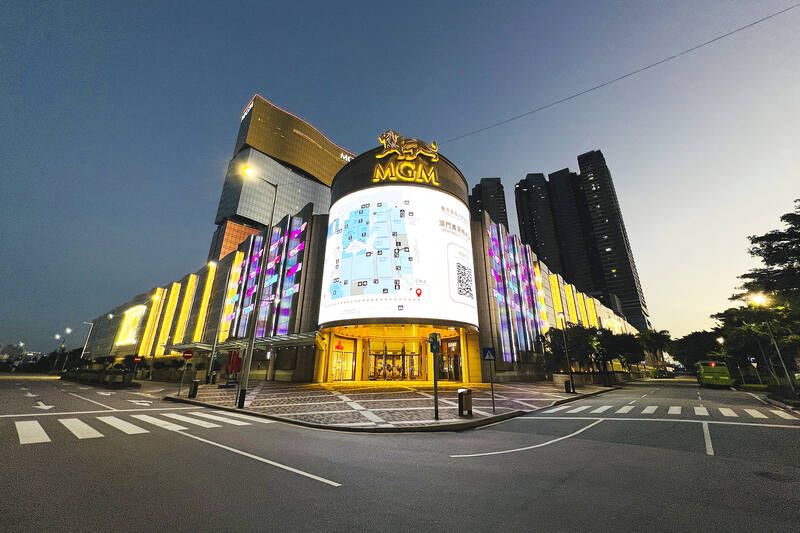Macau has tentatively renewed the casino licenses of MGM Resorts International, Las Vegas Sands Corp, Wynn Resorts Ltd and three Chinese rivals after they promised to help diversify its economy by investing in non-gambling attractions, the government said on Saturday.
The announcement is positive news for owners who have invested billions of US dollars to turn the former Portuguese colony near Hong Kong into the world’s larges gambling hub.
However, the requirement to spend on theme parks, music and sports adds to financial pressure at a time when revenue has plunged under COVID-19 restrictions.

Photo: AP
Regulators are to negotiate final terms before the licenses take effect on Jan. 1, the office of Macanese Chief Executive Ho Iat Seng (賀一誠) said.
A seventh bidder, newcomer Genting Group of Malaysia, did not receive a license.
The territory of 700,000 people on a peninsula in the South China Sea is the world’s most tourism-dependent economy. It is under pressure from Chinese President Xi Jinping’s (習近平) government to diversify with retailing, entertainment and other industries and to reduce reliance on gamblers from the mainland, its main revenue source.
License applicants promised to fulfill requirements including “exploring overseas customer markets and developing non-gaming projects,” a government statement said.
It gave no details, but TDM Radio Macau reported that the winners would be expected to invest a total of US$12.5 billion.
Macau’s economy has shrunk since COVID-19 restrictions shut down most tourist travel in 2020.
The Chinese operators include SJM Holdings Ltd (澳門博彩控股), part of the empire of the late Stanley Ho (何鴻燊), who had a four-decade monopoly on casinos until 2001.
The others are Melco International Development Ltd (新濠國際發展), run by Ho’s son Lawrence (何猷龍), and Galaxy Entertainment Group (銀河娛樂集團).
The decision to allow in foreign-owned casinos in 2002 brought a flood of money to Macau. The six license holders operate a combined 41 casinos.
Annual revenue from slot machines, dice tables and other games peaked at US$45 billion in 2013, more than triple Las Vegas’ level.
However, it slid after Beijing tightened controls on how often mainland gamblers could visit.
By 2019, before the COVID-19 pandemic, gambling revenue sank 19 percent from 2013’s level to US$36.4 billion. In 2020, it collapsed 80 percent to just US$7.6 billion. Last year, revenue climbed back to US$10.8 billion, but that is down 75 percent from 2013.
In the latest quarter, the economy shrank by another one-third from last year’s depressed level due to anti-virus controls imposed after outbreaks in June, the government said, adding that gambling revenue plunged 72.5 percent and tourist arrivals shrank 50.8 percent.
Adding non-gambling assets would make Macau more like Las Vegas. Casinos there try to attract families and non-gamblers with roller coasters, music, shopping centers, art exhibits and water parks.
SJM operates a zip line and indoor skydiving attractions. It dropped a proposal for a Hello Kitty theme park. The tycoon behind Galaxy talked about a possible theme park resembling the movie Avatar, which never went ahead.

Taiwan Semiconductor Manufacturing Co (TSMC, 台積電) founder Morris Chang (張忠謀) yesterday said that Intel Corp would find itself in the same predicament as it did four years ago if its board does not come up with a core business strategy. Chang made the remarks in response to reporters’ questions about the ailing US chipmaker, once an archrival of TSMC, during a news conference in Taipei for the launch of the second volume of his autobiography. Intel unexpectedly announced the immediate retirement of former chief executive officer Pat Gelsinger last week, ending his nearly four-year tenure and ending his attempts to revive the

WORLD DOMINATION: TSMC’s lead over second-placed Samsung has grown as the latter faces increased Chinese competition and the end of clients’ product life cycles Taiwan Semiconductor Manufacturing Co (TSMC, 台積電) retained the No. 1 title in the global pure-play wafer foundry business in the third quarter of this year, seeing its market share growing to 64.9 percent to leave South Korea’s Samsung Electronics Co, the No. 2 supplier, further behind, Taipei-based TrendForce Corp (集邦科技) said in a report. TSMC posted US$23.53 billion in sales in the July-September period, up 13.0 percent from a quarter earlier, which boosted its market share to 64.9 percent, up from 62.3 percent in the second quarter, the report issued on Monday last week showed. TSMC benefited from the debut of flagship

A former ASML Holding NV employee is facing a lawsuit in the Netherlands over suspected theft of trade secrets, Dutch public broadcaster NOS said, in the latest breach of the maker of advanced chip-manufacturing equipment. The 43-year-old Russian engineer, who is suspected of stealing documents such as microchip manuals from ASML, is expected to appear at a court in Rotterdam today, NOS reported on Friday. He is accused of multiple violations of the sanctions legislation and has been given a 20-year entry ban by the Dutch government, the report said. The Dutch company makes machines needed to produce high-end chips that power

Taiwan would remain in the same international network for carrying out cross-border payments and would not be marginalized on the world stage, despite jostling among international powers, central bank Governor Yang Chin-long (楊金龍) said yesterday. Yang made the remarks during a speech at an annual event organized by Financial Information Service Co (財金資訊), which oversees Taiwan’s banking, payment and settlement systems. “The US dollar will remain the world’s major cross-border payment tool, given its high liquidity, legality and safe-haven status,” Yang said. Russia is pushing for a new cross-border payment system and highlighted the issue during a BRICS summit in October. The existing system